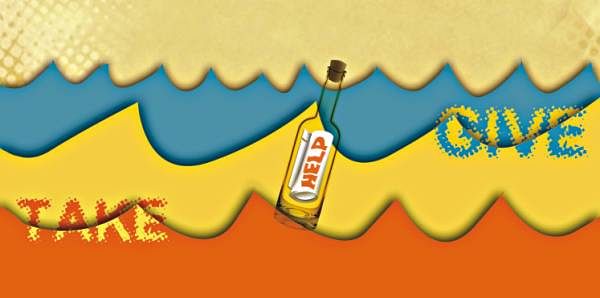 Who gets the cookie?
Who gets the cookie?
Story: Sifana Sohail
Cover art: E R Ronny
"Before we set out to fix the world's problems we should first look in our own backyard.”
The words drift over the assembly, unheard. The impatient faces waiting to get to class and start the day did not have time to ask and answer the incessant drone. Life had more important demands.
But some among them paid attention. Some went out and did things instead of thinking about it from the safety of their beds. They tried to make a change. But where should one start? And where exactly should one focus? How do you decide where the help is needed more? Who is the judge? The quote has that aura of self-assurance to make it seem above doubt. One should start from one's own backyard. Things are wrong here, but are they the worst?
“If everyone helped their own country,” Shejuti* says, “then all of the countries would be helping themselves and they'd all improve or develop.” In a perfect world, it would work; in fact that is what seems to be encouraged these days. Going local to go global - same principle right?
“Not all countries need the same amount of help,” counters Anika*. “Other countries might need the help more, in which case they should have a higher priority.” Tania* agrees with her. “As much as I love my country, I wouldn't take away help from someone who needed it more,” she says. In fact, many people seem to have this outlook - that it doesn't matter where the person comes from, if they need the help more, the should get it.
“Most people would actually help the Bangladeshi,” Arman* claims, “and they wouldn't have a reason to justify that decision.” Some Bangladeshis are more angered by this claim. Patriotism is reason enough they say. They want their country's people to do better. “While our country needs help, why should we spend our money elsewhere? This is where I come from; I have a duty towards this country.” From his speech you can tell that Navid* feels very strongly about his words. For those who agree with Navid*, the word duty pops up frequently in their speech. It's because they were born and raised in this country, they explain. If they had anything to give, they would give back to her.
“I'd choose the Bangali citizen, as I would have an easier grasp of his mentality, which may lead me to understand and solve his problem, and thus aid him more than I could for a non-Bangali fellow.” Imran* explains, putting a different spin on it. “But if the international one needed more help, I'd look over my fellow Bangali citizen, because being sensible, you'd help someone who needs it more than someone who doesn't need it that much.” “For the sake of camaraderie,” Shadman*, whose ideas seem in agreement, starts, “if they were on completely equal ground I would help the Bengali person. If the international person needed more help I would help them, provided they were sufficiently better, as a person, than the Bengali.”
It's a hard question to answer, despite how easy it may seem initially. There are so many factors to consider. “What do you have to give, to help with? Is it money? People? Food? An organisation?” Sara* questions in return. “It depends on so much. Throwing money at a problem doesn't make it go away. If you don't like what you're doing, or don't have the patience, it's better to help someone else with something you're capable of doing instead of backing out or giving substandard help.” A Bangladeshi from abroad says that roots are deep. “You feel this compulsion, to help these people that you don't really know.” So do we have an unjustifiable urge to help our own kind ingrained in us? Or are we unpatriotic in our endeavours to help the needier man? “You have to make peace with your choices; if you can justify them, you should be satisfied. After all, we're all people.” Rashed* quips.
*NAMES HAVE BEEN CHANGED TO PROTECT IDENTITIES, THE VALUES OF FREEDOM OF SPEECH AND ANGRY RANTS AGAINST PEOPLE WHO MAY HAVE THE SAME NAME.

